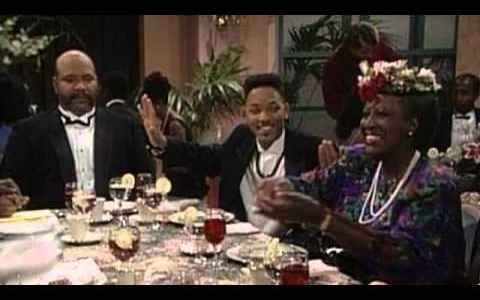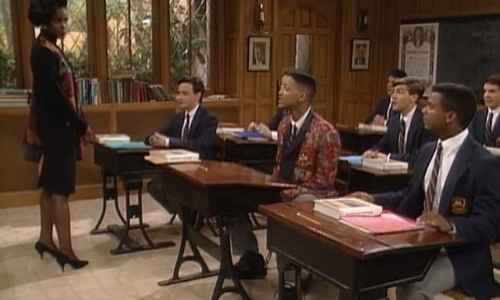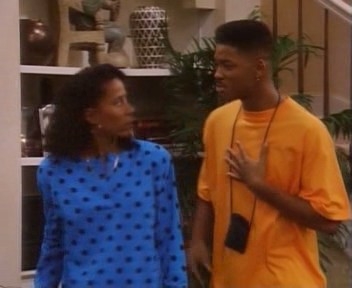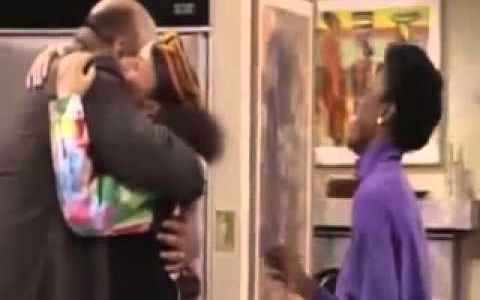Race and Class in The Fresh Prince of Bel Air
The Fresh Prince of Bel Air (1990-96) centers on Will Smith, sent to live with his biological aunt’s family after struggling in his working class background. Although The Fresh Prince of Bel Air is best remembered for Will’s exploits, chasing girls and finding himself in various predicaments, there are episodes which deal with serious subject matter. As a sitcom centered upon a wealthy black family, it is inevitable The Fresh Prince of Bel Air would examine issues of race and class within society. The episodes listed below reflect The Fresh Prince of Bel Air‘s sincere writing quality that is usually not associated with its reputation.
4. Not with My Pig, You Don’t – Class-based Vanity
 Phil and his Mother come into conflict over his embarrassment regarding their rural past.
Phil and his Mother come into conflict over his embarrassment regarding their rural past.Not with My Pig, You Don’t begins with Phil’s announcement that he will receive an Urban Spirit Award as recognition for helping “our brothers and sisters in the streets”. This leads to Will making a class-based joke about Phil’s chauffeur, which Phil denounces due to his contribution towards black working class people. Yet Will’s joke has significance once Phil’s parents arrive. Phil presents himself as a successful lawyer with elegance and taste in terms of his clothing, mansion and other accessories. Phil’s mother Hattie deconstructs by referring to him as Zeke (his childhood name) and his rural North Carolinian upbringing. Phil’s rural upbringing includes skinny dipping with his pet pig Melvin and becoming a pig racing champion, which Phil has not disclosed to the public as it is a clear contradiction of his desired image. The distinction between Phil and his parents’ attire, formal suits against casual clothing, reflects the extent in which Phil has gone to maintain an image of wealth and success.
Phil’s determination to move away from his rural background results in confrontation, once a newspaper interview goes astray. When news reporter Susan Klein believes Phil’s life story is dull, Will gives her Phil’s childhood stories. “You destroyed my image!” is Phil’s mortified response, which Hattie overhears. Hattie confronts Phil over his remarks, “that is where you are from Zeke!”. Hattie’s comment reveals Phil’s contradictory nature. Phil acts as if being highly successful and having a rich lifestyle is second nature to him, yet he has forgotten his rural upbringing which built his character. This results in Phil contemplating his thoughts regarding his image accepting his rural past. Phil realises that he “didn’t have it that hard” as his parents always loved him, thus making his rural background insignificant to his reputation.
3. The Ethnic Trip – Understanding One’s Racial History

Vivian temporary teaches Will and Carlton’s History class to advocate black culture.
The Ethnic Trip reflects difficulties in incorporating black culture into an established institution, as well as understanding one’s own culture. In this case it is Bel Air Prep, an elite private school where the majority of students are white. Throughout Will’s time at Bel Air Prep, he is insistent on his own individuality. Will expresses his individuality through wearing his jacket inside out, decorating it with badges of black icons. Will says it is his individualism that has resulted in bad grades in history, due to no black culture being taught. This strives Vivian to help Will voice his opinion at a parents-teachers meeting. The committee is apprehensive about Will’s idea, claiming that there is not enough space in their curriculum. This could be read as institutional racism, as Bel Air Prep’s need for conservatism means no criticism of America’s racial history. Yet this is soon defeated by Vivian, who offers her teaching experience to Will’s history class.
However Will conveys an arrogance over his own races’ history, feeling that he will gain good grades simply because he is black. However, Vivian’s strict teaching discipline and vast knowledge on black culture regularly corrects Will’s assumptions or generalisations. For example, although Will recognises slave songs, he cannot clarify their connection to abolitionism. It takes Vivian to make Will aware of this fact. By the end of Vivian’s tenure as Will’s history teacher, he has not fully improved as a student. Vivian confronts Will regarding his academic stagnancy, who defends himself by saying he had read Malcolm X’s autobiography three times. Vivian becomes irritated by Will’s response, stating that he is trivalising black culture by only studying specific aspects rather than its whole. This realisation not only makes Will understand his own arrogance, but also the importance of understanding one’s own racial history. The Ethnic Trip shows how race should to be understood from both sides, that of established institutions hesitant in accepting change while individuals needing to fully understand their own culture.
The Ethnic Trip reflects difficulties in incorporating black culture into an established institution, as well as understanding one’s own culture. In this case it is Bel Air Prep, an elite private school where the majority of students are white. Throughout Will’s time at Bel Air Prep, he is insistent on his own individuality. Will expresses his individuality through wearing his jacket inside out, decorating it with badges of black icons. Will says it is his individualism that has resulted in bad grades in history, due to no black culture being taught. This strives Vivian to help Will voice his opinion at a parents-teachers meeting. The committee is apprehensive about Will’s idea, claiming that there is not enough space in their curriculum. This could be read as institutional racism, as Bel Air Prep’s need for conservatism means no criticism of America’s racial history. Yet this is soon defeated by Vivian, who offers her teaching experience to Will’s history class.
However Will conveys an arrogance over his own races’ history, feeling that he will gain good grades simply because he is black. However, Vivian’s strict teaching discipline and vast knowledge on black culture regularly corrects Will’s assumptions or generalisations. For example, although Will recognises slave songs, he cannot clarify their connection to abolitionism. It takes Vivian to make Will aware of this fact. By the end of Vivian’s tenure as Will’s history teacher, he has not fully improved as a student. Vivian confronts Will regarding his academic stagnancy, who defends himself by saying he had read Malcolm X’s autobiography three times. Vivian becomes irritated by Will’s response, stating that he is trivalising black culture by only studying specific aspects rather than its whole. This realisation not only makes Will understand his own arrogance, but also the importance of understanding one’s own racial history. The Ethnic Trip shows how race should to be understood from both sides, that of established institutions hesitant in accepting change while individuals needing to fully understand their own culture.
2. Guess Who’s Coming to Marry? – Issues Over Interracial Marriage
 Will’s mother Vi is at odds with an interracial marriage.
Will’s mother Vi is at odds with an interracial marriage.Will’s family comes together for his Aunt Janice’s wedding, though everyone becomes surprised as Janice’s groom Frank is white. Their shock is emphasised for the audience moments before when a handsome black man walks into the Banks residence, who is taken for granted as Janice’s groom. When Frank walks in, Phil paid him cab fare assuming he is the taxi driver. Phil’s actions embodies the families’ racial preference, assuming Janice will marry a black man. As the family recovers from their shock, Janice explains that she did not reveal Frank’s racial identity in case her family will not accept their relationship. Helen, one of Janice’s older sisters, proclaims that “you can’t control who you fall in love with” advocating racial tolerance. However, Vi initially discriminates against the marriage. Vi claims that Janice will make her life difficult by marrying a white man, to the point where she may lose friends and become a social outcast due to possible racial tensions.
Vi’s discrimination goes as far as attempting to block Will from the wedding. Vi feels that she is being disrespected, as Janice is going against how they were raised, which is a sign of Vi’s prejudice. Yet Will is adamant in attending, saying that if he disobeys her prejudice, then is he truly worthy of her love? This makes Vi contemplate her views and understand her prejudice. Vi’s prejudice is shown as destructive within a family structure, causing divides. Guess Who’s Coming to Marry? breaks down the reasoning for interracial divides and shows that society can be tolerant. Vi realises that it does not matter if Janice and Frank are an interracial couple, as long as they love each other.
1. Those Were The Days – Analysing One’s Class Identity
 Phil and Vivian are reunited with their activist friend Marge.
Phil and Vivian are reunited with their activist friend Marge.Phil and Vivian are reunited with Marge, a friend from their activist days. Marge’s presence at their home has a profound effect on everyone’s conscience regarding their class position. Marge continuously calls Geoffrey, the Banks’ butler, a “pathetic servant of capital fat cats”. This not only refers to Geoffrey’s submissive standing, but also an insult towards Phil and Vivian for their bourgeoisie lifestyle. Marge knew Phil and Vivian when they were still predominantly working class, which reflects Marge’s views that Phil and Vivian have betrayed their values. The differences in their lifestyles becomes further evident when Marge influences Will, after announcing his displease over his photography teacher’s sacking. Will’s photography teacher is dismissed after parents raised concerns regarding a planned trip to an exhibition. Marge tells Will that if he is angered by the decision, then he must act. This results in Will along with a fellow pupil staging a protest by locking themselves in a classroom. Will feels this protest is vital in demonstrating his displeasure of his teacher’s dismissal, therefore animating his views.
Will’s protest results in school suspension. While Marge believes Will’s actions is admirable, Phil and Vivian are not impressed. This causes a confrontation where Marge instigates that Phil and Vivian had lost their activists ideals, as they had become too familiar with their rich surroundings. This is fiercely contested by Phil, who reminds Marge of his civil rights activities and how they still influence him. This includes supporting working class black citizens for their civil rights, which was a primary aim for black activism. It became clear that despite Phil and Vivian’s wealth and status, they have never forgotten their activist ideals. Vivian continues the argument by saying participation in activism does not mean working outside the system. It can be working within the law by signing petitions or hosting committee meetings. This emphasises Phil and Vivian’s activist ideals, not forgetting their youthful class values despite their current bourgeoisie lifestyle.
These episodes show that The Fresh Prince of Bel Air is capable of sincerity, dealing with themes of race and class. These themes are never taken lightly, they are represented in a vivid and confronting manner. Each episode raises questions as to how race and class should be portrayed and discussed within society.
What do you think? Leave a comment.
Share on Facebook Share on Twitter
Posted on Jun 8, 2015 by
Ryan Errington
Contributing writer for The Artifice. I have a deep interest in films, television and the arts.
Edited by Joe Manduke, S.A. Takacs.
No comments:
Post a Comment